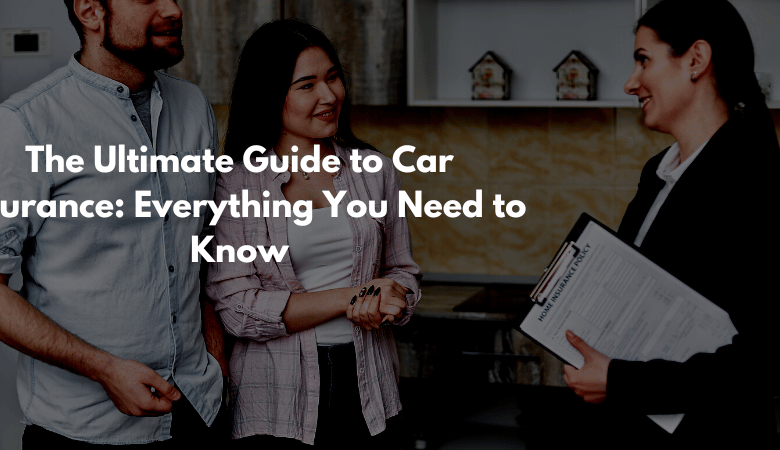The Ultimate Guide to Car Insurance: Everything You Need to Know

Car insurance is a contract between you and an insurance company. You agree to pay the premium and the insurance company agrees to pay your losses as defined in your policy.
Most people buy car insurance for one of two reasons:
1) They are required to by law.
2) They want protection in case of an accident.
If you are financing a car, your lender will require you to have comprehensive and collision coverage. Even if you own your car outright, it is still a good idea to have at least liability coverage in case you are sued for damages after an accident.
There are many different types of car insurance coverage, but the three basic types are: liability, collision, and comprehensive.
Liability Coverage: This is the most basic type of coverage and it pays for damages if you are responsible for an accident. It does not pay for any damage to your own vehicle. Collision Coverage: This type of coverage pays for damage to your own vehicle if you are involved in an accident with another vehicle or object. Comprehensive Coverage: This is the most complete type of coverage and it pays for damage to your own vehicle from events other than collisions, such as theft, vandalism, or weather damage.
The Different Types of Car Insurance
-Liability: This is the most basic type of car insurance and covers any damage or injury that you may cause to another person while operating your vehicle. It does not cover any damage to your own vehicle.
-Collision: This type of insurance covers damage to your own vehicle in the event of an accident, regardless of who is at fault.
-Comprehensive: This is the most complete type of car insurance and covers damage to your own vehicle from a variety of causes, including weather, theft, and vandalism.
How Much Car Insurance Should You Buy?
When it comes to car insurance, there is no one-size-fits-all answer. The amount of coverage you should buy depends on a variety of factors, including your state’s minimum insurance requirements, your vehicle’s value, your driving record, and your personal finances.
To help you determine how much coverage you need, consider these three questions:
1. What are your state’s minimum insurance requirements?
2. How much is your vehicle worth?
3. What is your driving record like?
Once you’ve answered these questions, you’ll have a better idea of the minimum amount of coverage you need to purchase. From there, you can decide if you want to buy additional coverage to protect yourself financially in the event of an accident.
What Factors Affect Your Car Insurance Rates?
There are many factors that affect your car insurance rates. Some of these include your age, gender, driving history, credit score, the type of car you drive, and where you live. Your rates may also be affected by whether you use your car for business or pleasure, how much you drive it, and what kind of coverage you need.
How to Get the Best Car Insurance Deal
When it comes to car insurance, you want to get the best deal possible. Here are a few tips on how to get the best car insurance deal:
Shop around. Don’t just go with the first company you come across. Get quotes from multiple companies and compare them.
Ask for discounts. Many companies offer discounts for things like good driving records, safety features on your car, etc. So be sure to ask about any discounts that might be available to you.
Consider raising your deductible. This will lower your premium, but make sure you can afford the deductible if you do have an accident.
By following these tips, you should be able to get the best car insurance deal possible.
The Different Types of Coverage
There are many different types of car insurance coverage, and it can be difficult to understand all of them. Here is a brief overview of the most common types of coverage:
Liability Coverage: This is the most basic type of insurance, and it covers damages that you may cause to another person or their property. It does not cover any damage to your own vehicle.
Collision Coverage: This type of coverage will pay for repairs to your own vehicle if it is damaged in an accident. It does not cover any damage that you may cause to another person or their property.
Comprehensive Coverage: This type of coverage will pay for repairs to your own vehicle if it is damaged by something other than an accident, such as theft, vandalism, or weather damage. It does not cover any damage that you may cause to another person or their property.
Medical Payments Coverage: This type of coverage will pay for medical expenses incurred by you or your passengers as a result of an accident. It does not cover any other expenses, such as property damage or liability claims.
Personal Injury Protection (PIP): This type of coverage is similar to medical payments coverage, but it also covers lost wages and other expenses incurred as a result of an accident. PIP is only available in certain states.
Uninsured/Underinsured Motorist Coverage: This type of coverage protects you if you are involved in an accident with a driver who does not have insurance or does not
What to Do If You Can’t Afford Car Insurance
If you can’t afford car insurance, there are a few things you can do. You can try to get a cheaper policy, you can drive without insurance, or you can try to get financial assistance.
If you want to get a cheaper policy, you can try to shop around for a better rate. You can also see if you qualify for any discounts. If you have a good driving record, you may be able to get a discount. You can also see if your employer offers any discounts.
If you want to drive without insurance, you can do that but it’s not recommended. If you get into an accident, you will be responsible for all of the damages. If you cause an accident, you could be sued and have to pay for all of the damages yourself.
If you need help paying for car insurance, there are some options available. You may be able to get assistance from your state’s low income assistance program or from the National Insurance Crime Bureau.
Conclusion
Car insurance can be confusing, but with the right information and guidance, you can make sure that you get the coverage that is best for your needs. We hope this guide has been helpful in giving you an overview of what car insurance is and how it works so that you know exactly what to look for when shopping around. Make sure to compare quotes from different companies before making a decision so that you’re getting the best deal possible. Good luck!




